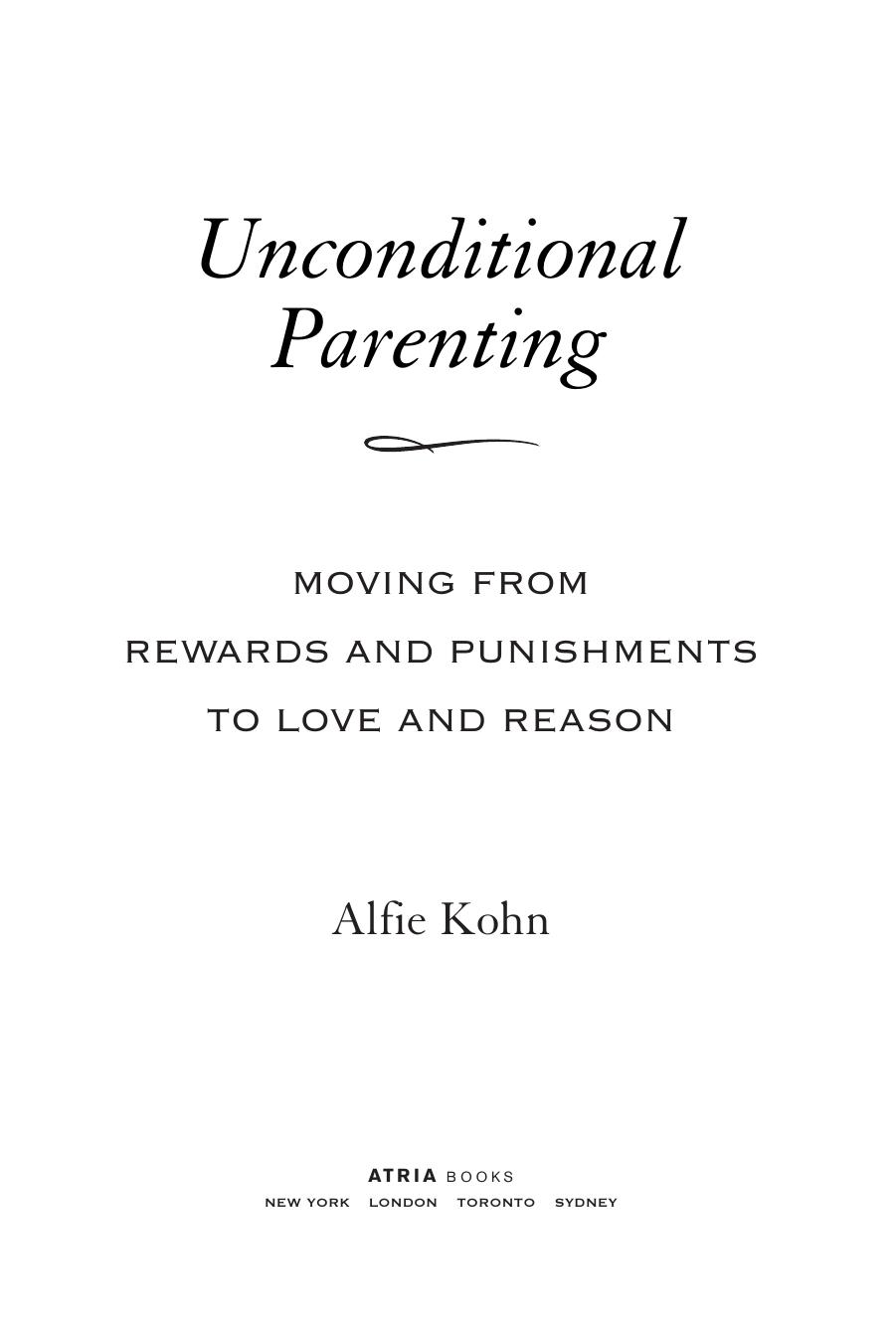Unconditional Parenting: Moving from Rewards and Punishments to Love and Reason by Alfie Kohn

Author:Alfie Kohn [Kohn, Alfie]
Language: eng
Format: epub, pdf
Publisher: Atria Books
Published: 2006-03-28T04:00:00+00:00
8
LOVE WITHOUT STRINGS ATTACHED
Unconditional acceptance may be desirable, but is it possible? Before responding to this critical question, let’s be clear about what we’re asking. The issue here is not whether people can accept themselves without conditions—that is, whether anyone has truly unconditional self-esteem. (See pp. 226–27n21.) Rather, what we want to know is whether it’s realistic to think that we can accept and love our children for who they are, with no strings attached.
Here I think the answer is clearly yes. Lots of parents feel that way. But is it possible, on a day-to-day basis, to act with our children in such a way that they never doubt our love? Keep in mind that we have to frustrate them by saying no sometimes. Occasionally we may become impatient or even angry with them. And children often have trouble distinguishing people’s underlying feelings from their passing moods. So can we ensure that they’ll always feel unconditionally loved?
Probably not. But our objective should be to come as close as possible to that ideal. After all, perfect happiness may also be an unreachable goal; it is, as one writer put it, an imaginary condition that’s usually attributed to children by adults, and to adults by children. But that doesn’t (and shouldn’t) stop people from trying to be happier than they are.1 The same is true of kindness, wisdom, and other qualities that are imperfectly realized.
The fact that so many parents seem to accept their children only conditionally doesn’t make that practice any less damaging or any more acceptable. And remember, we’re not talking about spoiling kids or taking a hands-off approach to raising them. Unconditional parents play an active role in the lives of their children, protecting them and helping them learn right from wrong. In short, the question isn’t whether we should try to come closer to being unconditional parents. Nor is there much doubt about whether we can do so. Just because there will always be room for improvement doesn’t mean that we can’t do better than we’re currently doing. We can and we should. The question is how.
Download
Unconditional Parenting: Moving from Rewards and Punishments to Love and Reason by Alfie Kohn.pdf
This site does not store any files on its server. We only index and link to content provided by other sites. Please contact the content providers to delete copyright contents if any and email us, we'll remove relevant links or contents immediately.
| Early Childhood | Parenting Boys |
| Parenting Girls | School-Age Children |
| Single Parents | Teenagers |
The Lost Art of Listening by Michael P. Nichols(7506)
Rich Dad Poor Dad by Robert T. Kiyosaki(6633)
We Need to Talk by Celeste Headlee(5615)
I Love You But I Don't Trust You by Mira Kirshenbaum(3876)
The Complete Idiot's Guide to Coping With Difficult People by Arlene Uhl(3149)
Rich Dad Poor Dad: What The Rich Teach Their Kids About Money - That The Poor And Middle Class Do Not! by Robert T. Kiyosaki(2958)
A Burst of Light by Audre Lorde(2607)
The Book You Wish Your Parents Had Read (and Your Children Will Be Glad That You Did) by Philippa Perry(2528)
Dealing with People You Can't Stand by Dr. Rick Brinkman(2460)
Life Hacks by Dan Marshall(2456)
An Odyssey by Daniel Mendelsohn(2309)
The Expectant Father by Armin A. Brott & Jennifer Ash(2273)
Teach Your Child How to Think by Edward De Bono(2159)
No Time to Say Goodbye(2118)
What I Need by J. Daniels(2082)
The 7 Habits Of Highly Effective Teens by Covey Sean(2080)
The Out-of-Sync Child by Carol Stock Kranowitz(2055)
The Anxious Generation by Jonathan Haidt(2051)
I Don't Belong to You by Keke Palmer(2005)
